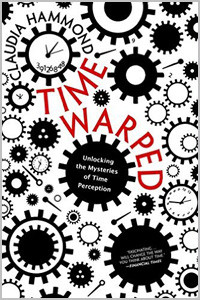Time Warped
Unlocking the mysteries of time perception
by Claudia Hammond. Published by Canongate www.canongate.tv
Time flies like an arrow (and, of course, fruit flys like a banana). But why? The ‘time flies’ that is, not the fruit flys (who doesn’t like a banana?).
Why do our childhood summers stretch for years while our middle-age Christmases seem an almost monthly occurrence? Why does time speed up as we get older or – as in the case of Chuck Berry (not that Chuck Berry) – why does it slow down when the wings fall off your glider at 2,000 feet?
Hammond is a psychology lecturer, broadcaster and synaesthete (that is, she see letters as colours) and in ‘Time Warped’ she mixes research, personal anecdote and original surveys done on her radio show to investigate that deceptively simple and surprisingly mutable concept we refer to as ‘time’.
We discover that, rather unfairly, misery and fear seem to stretch time. Telling research subjects they were rejected as partners by the rest of their group or throwing them (more or less safely) off tall buildings slowed their perception of time. At least one study suggests that people suffering from depression experience time as flowing half as fast as for non depressed people. It’s even been suggested that a simple ‘time perception’ test could help assess suicide risk.
How we perceive time seems a bit of mystery though. We have no ‘central clock’ in our brains ticking through minutes or hours yet we can perform tasks that take tiny fractions of a second and estimate (with a little work) the year of origin of every memory we hold. There are a number of competiting theories of time perception in the brain and Hammond give an overview of several. None are wholly satisfactory and it would seem our time sense is really a combination of several different mental counting mechanisms. Clever as they are, these can lead us astray either through sickness, accident of birth or, as one dedicated researcher discovered, by living underground for three months. Even how we visualize time can be surprisingly idiosyncratic – do you see time as a clock, a river, a line (straight or jagged) or, if you experience synesthesia like Hammond, are all your Mondays red?
The language of time can be tricky too. Answer quickly: next Wednesday’s meeting has been moved forward two days. What day is the meeting now?
You hesitated didn’t you? Not because you didn’t have an intuitive answer but because you knew your intuitive answer wouldn’t be shared by others. ‘Monday’ or ‘Friday’ depends on whether you subconsciously see yourself moving through time or time flowing towards you. Perhaps you find that example a little too pat and that is a flaw in ‘Time Warped’ as Hammond’s pop science might have too much ‘pop’ for some. But there’s intriguing stuff here too. There’s the difference between our prospective and retrospective systems for estimating time (or why your friend’s children seem go from toddlers to teenagers in a couple of years), the ‘Reminiscence Bump’ (or why summers don’t last as long) and our unwarranted optimism in estimating the future (or putting off projects ‘till we have more time’ – something I’ve certainly experienced – you’re reading it)
As for Mr. Berry falling from the sky? You’ll be glad to hear he activated his reserve parachute just in time and survived with only minor injuries. His unexpected experiment in time dilation made his 10 second freefall ‘last forever’.
Don’t try this one at home.
